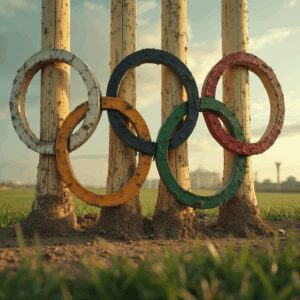Sport – A Reflection of Society
During the closing stages of the recently concluded Olympic Trials for track and field athletes in the USA, one of the athletes protested on the podium. The athlete has protested before and has been very fearless in publicly declaring her commitment to her cause and that of so many millions of black people in the USA and around the world. There is absolutely no doubt that having made the US team to the Tokyo Olympics, she would continue her protest. She is not concerned about any action that the IOC may take against her once she protests.
The aforementioned athlete is but one of many who are prepared to protest in support of the causes they espouse, regardless of the consequences from those in authority.
What we are confronting is an overt expression of the reality that many sports administrators and governments have often sought to deny, that sport is but a reflection of society.
Those in government and those in leadership positions in sporting organisations around the world have often sought to impose their beliefs, values and norms on the majority. They reflect the Durkheimian and generally functionalist stance that ‘the individual is born of society, not the society of the individual’, thereby denying the individual human being from being an active participant in his own and the wider societal development. In every historical epoch, we have consistently failed to come to terms with the annoying reality of discrimination in society and inevitably, its presence in all its aspects.
Discrimination
Through the years we have seen discrimination in several forms becoming normative as much in sport as in society, more generally.
Class discrimination
Historical and archaeological records of Ancient Greece, home to the earliest Olympics have shown evidence of discrimination based on class – an individual’s relationship to the means of production in society.
The poor were discriminated against in every sphere of society at the time and few in authority ever thought otherwise.
Under the guise of pseudo-intellectualism, the upper classes created and sustained a belief that they and their successive generations were graced with a divine right to rule in every aspect of life, economic, socio-cultural and political. So it was that in the Ancient Olympics, we observed the startling contradiction where at the theoretical level, one section of the society, the ruling class, perpetuated a philosophy that sport was good for society; that it promoted positive values that held society together.
In essence, however, the values perpetrated in sport were the very values the ruling classes held for themselves and which they used to entrench discrimination against the lower classes in their own societies.
Members of the lower classes, considered lacking the intellectual to pursue academic endeavours, were left out of sports. One of the reasons may also have been that should they defeat the upper-class athletes in sport they may begin to think themselves either equal to or better than those who lord it over them in society. That may give rise to rebellion and the eventual overthrow of the existing economic, political and socio-cultural order. The fear of losing the control they had on society and possible reprisals for the way they oppressed those whom they controlled others ‘below’ them was enough for them to find novel ways of maintaining their dominance and others, to accept their subservience as if either divine or natural.
Not surprisingly, wherever European economic expansionism went it was always accompanied by their elitist ambitions and these were manifested in every aspect of social life.
Conquest and colonisation all led to the same objective and everywhere sport was introduced in the same manner, with the same values being encouraged.
Throughout history, there has always been one rule for the upper classes and another or others for the remaining classes, as much in sport as in all other social institutions.
The Modern Olympic Movement, rather than being seen as a revolution of sorts, as some would have us believe, was and is to this day, just another vehicle created and sustained by the upper classes, dominated as it is by representatives of countries that may well still believe that they possess some divine right to use sport to continue their global leadership.
Sport today reflects the very class distinctions that have characterised global history.
Gender discrimination
Women have been discriminated against throughout history, for the most part.
When men found women posing challenges to their self-deluded dominance in society they created ways to justify their discrimination and this, as much in sport as in all other aspects of life.
Pseudo-scientific research was heralded as a primary factor in justifying the myth that somehow women were inferior to men in every aspect.
In Ancient Greece, women were forced out of sport and this extended to efforts to deny them any right to even attend competitions.
Just as women found themselves shaving to use men’s names to get their academic works recognised enough to gain publication, so too they had to find novel ways to get into sports, to train and compete, forcing themselves onto their respective national stages.
Even the much-lauded efforts at creating the Modern Olympics found room to discriminate against women in the very beginning.
It took several decades for some of the sports that now benefit from women’s participation and outstanding performances equal to or better than their male counterparts, to hold women aloft.
Importantly, it took centuries of work for women to have their sporting achievements leaving them recognised as women rather than some weird biological phenomenon that was more like men than women.
The exposure of the tragedy of US Gymnastics has opened a can of worms that will eventually showcase that the sport itself, at a global level, may well have facilitated sexual harassment of minors and that the wealthy parents of the children involved in it may well have been complicit. Many wonder whether it is that the parents were so eager to maintain their social standing through sport that they sacrificed their own children ‘on the altar of expediency’…
Even now, the sporting world has turned its back on Caster Semenya of South Africa as she struggles with her physiological reality. She is not alone. There are many more athletes who have that condition and instead of facilitating the allocation of appropriate resources for scientific research, international sports organisations have eagerly cast them aside as unique aberrations to what they deem the norm. They do not fit in.
It remains a travesty that international sports institutions can so readily find resources for projects and research that fits in with their traditional understanding of what constitutes, and who should be involved, in sport, that they clearly lack the very principles they claim to promote and support.
Racial discrimination
Racism is as old as society itself.
Hitler did not start racism, he merely took hold of its pervasively global nature and dared to systematically challenge the world to officially recognise it. In doing so, its offensive nature was exposed and many leaders around the world, shocked that they were supportive of this same racism in their respective countries came together to deny that this was in fact the case.
Had Hitler not tied his racist ideology to his German expansionist ideals he may well have been accepted by global leaders who, in their respective countries, turned a blind eye to their own practices of systemic racism.
In sport, the legendary American Indian shook the world through his Olympic exploits only to have his achievements wiped off the record books for nonsense.
Jack Johnson and Mohammed Ali in boxing, Arthur Ashe and the Williams sisters in tennis, Jesse Owens, Tommy Smith, John Carlos, Lee Evans and the Australian who joined the Americans in protesting at the 1968 Olympics in Mexico, have all understood the importance of standing up to racial discrimination. They each paid a heavy price for freedom. They fought for the right to be recognised.
The Williams sisters proved resilient in their insistence that competence and proficiency in the sport mattered.
While Tiger Woods seemed to fumble in respect of who he was, and Jesse Owens wavered from time to time, the athletes at the Mexico Olympics never hesitated. They knew the cost and stood tall in defiance of an established order that was and perhaps still requires destruction. Dismantling it only allows it time to recover and return to its old habits in new forms.
The Williams sisters took the path of Arthur Ashe, Mohammed Ali and the athletes at the Games in Mexico.
When Colin Kapernick took the knee in protest against racial discrimination in the US, he was rejected by the rich and powerful that controlled the NFL. They thought he would be laughed to scorn.
When Nike stood by his side it was suddenly clear to many of the economic powerhouses that it was ‘better to join them than go against them’ even in protest since their engagement in sales of their products was greater than not having their monies so expended. The likes of Allyson Felix, at the World Championships in Doha, Qatar, declared that she can no longer stay silent, after her experience as an athlete in childbirth and her own impression of how Nike responded to her reality at a time of what she thought was her ‘hour of greatest need’.
Black athletes around the world are still coming to terms with this ‘other reality’. It is not new. It happened in the midst of the Black Power and Black Panther challenges of the 1970s which were followed by wealthy entrepreneurs, including media moguls, playing the game of ‘alliance with the cause’ only to emerge all the wealthier for having done so.
Solutions???
The determination of Kobe Bryant and LeBron James to ‘get real’ and put money into life-changing projects that allow successive and future generations of disenfranchised and racially discriminated children to understand their history and work to change the future, is beginning to have an impact.
Hamilton Lewis has persuaded Formula 1 to take notice of his own eagerness to be part of the solution and has added his vast financial resources to facilitate research and engagement of young, otherwise disenfranchised youth, born into discrimination, opportunities they would not have had, under normal circumstances, to realise their potential in sport and indeed, in life.
There is an ever-increasing number of sports personalities who are now showing that sport can make a difference as an educational tool.
Naomi Osaka has added her voice to the once powerless in sport.
They are no longer only in sport for the money. They understand only too well that the wealthy have been able to use money to support their causes and that the time has come for other ethnic and racial groups to do likewise.






